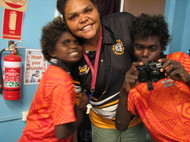Tiwi Islands field trip for Indigenous Literacy Foundation

Fremantle Press Media and Promotions manager Claire Miller recently returned from a journey to the Tiwi Islands with the Indigenous Literacy Foundation. The visit left her feeling inspired after seeing the power of the ILF’s work.
Tell me a bit about your involvement with ILF and your role on the trip to the islands.
Fremantle Press has been helping promote the Indigenous Literacy Foundation (ILF) in Western Australia for about four years by running events for Indigenous Literacy Day each September. Two Fremantle Press authors, Sally Morgan and May O’Brien, are ILF ambassadors and we’ve been very lucky to have local support over the years from His Excellency the Governor of Western Australia, author Kim Scott, Network Ten’s Narelda Jacobs, the State Library of WA, the Art Gallery of WA, the WA Museum and colleagues at Magabala Books and UWA Publishing.
My role on this trip was to observe, assist the ILF ambassadors in the classroom and, wherever possible, take the load off by doing minor chores around camp.
How would you describe the experience as a whole?
I would urge all authors and illustrators, journalists and members of the book industry to jump at the chance to see ILF’s work in the field. ILF run an uncomplicated but precisely targeted, and therefore very effective, program of writing workshops, reading activities, community publishing and book supply on behalf of the book industry.
Led by the unflappable and good-natured Tina Raye, Karen Williams and David Gaunt, and with the help of host Principal Ian Smith of Tiwi College, the ILF crew organised writing workshops at schools in Pickertaramoor, Pularumpi and Milikapiti. ILF ambassadors Andy Griffiths, Leonie Norrington and John Danalis were a huge hit with the kids who spent hours writing and illustrating their own stories as a result of the visit.
It was fantastic to see how the field trip was supported by the schools and the wider community. They were incredibly generous with their time, taking us on cultural excursions, opening up their arts organisations and museums and doing a huge amount of behind-the-scenes work to make us comfortable. Their care gave me a real sense of belonging, albeit for a short time.
What was the most memorable experience or encounter you had on the journey?
There were many memorable experiences but one little girl in her first year of kindy was particularly inspiring. According to her teachers she’d barely said a word since starting school but after a storytelling session with Leonie Norrington it was like she suddenly realised there were kindred spirits in the room! She and I had a long conversation about the alphabet.
Why is ILF’s work important?
Spending time in Tiwi classrooms with the ILF ambassadors taught me that, though every child wanted to communicate with us through story writing, not every child felt at ease about their ability to do so. Within each class the literacy levels varied from child to child but the ILF ambassadors gave them the desire and the confidence to give it a go. I can’t think of a single child who didn’t participate.
Why is it important that members of the community assist in choosing the books?
New books are a great help for any school library but it’s important the community gets a say in choosing which books they can use. Having books that parents and children in remote communities can connect with, read together and discuss will help build literacy skills. As readers, we all need books that reflect a world we can relate to and I think ILF is particularly sensitive to this in its work with remote communities.
Visit the ILF website to find out how you can get involved in Indigenous Literacy Day on 4 September and help raise funds


